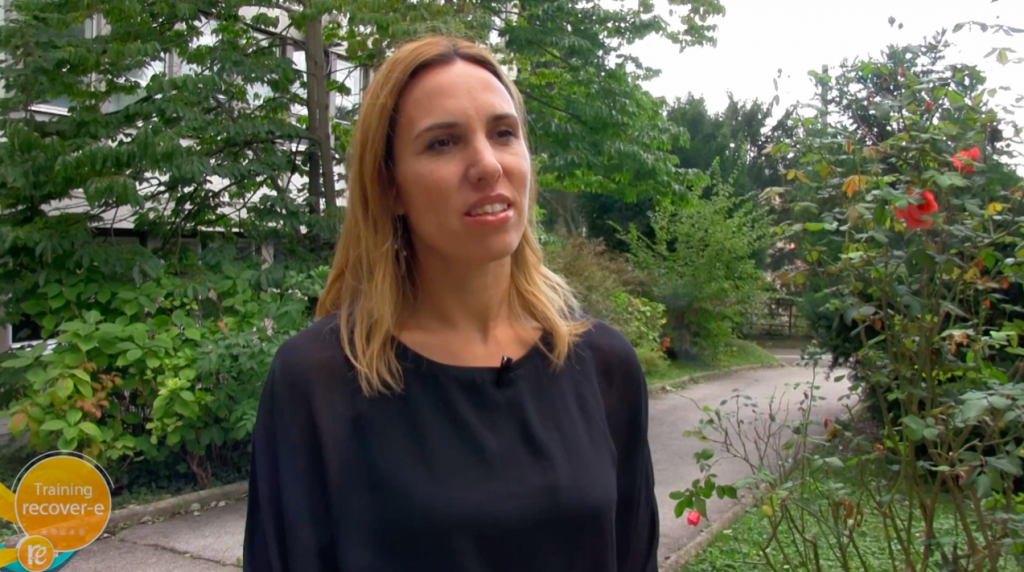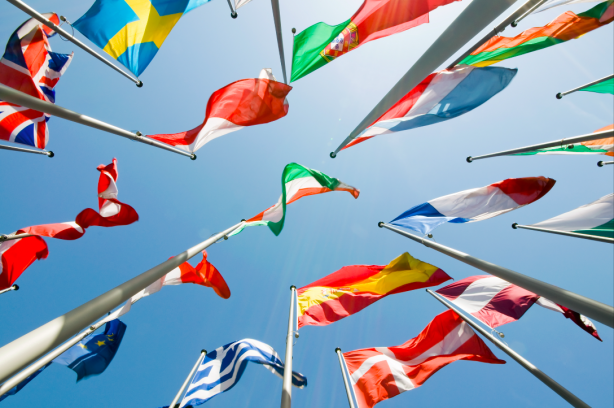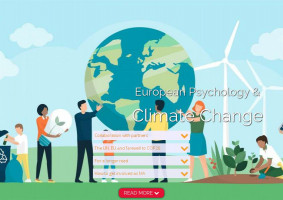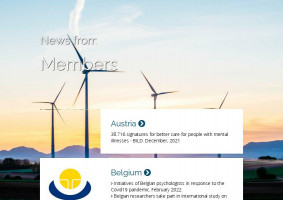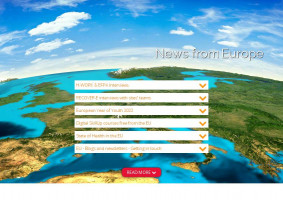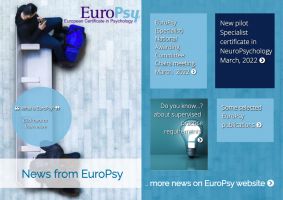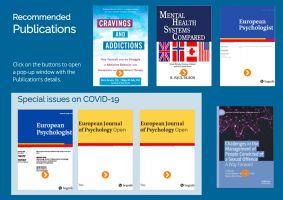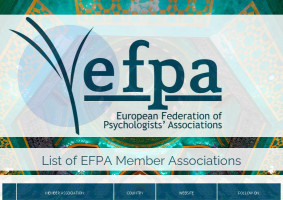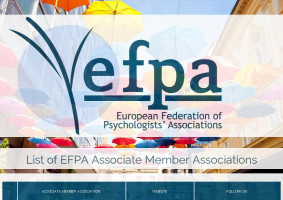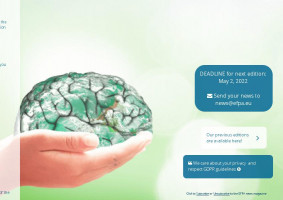READ MORE
EFPA & H-WORK
EFPA News Magazine Interview Section
EFPA is one of the 14 partners of the EU funded project H-Work Multilevel interventions to promote mental health in SME’s and Public Workplaces.
With this interview section in the EFPA News Magazine, we aim to keep our member associations informed about the progress in the H-Work project and to provide insight into the role of the different partners of the consortium. These interviews with project partners will become a permanent section. We hope it makes for a pleasant and informative read.
-
Interview Anne Etzelmüller from HelloBetter
Anne Etzelmüller, Team Lead Clinical Research at HelloBetter, registered trademark of GET.ON Institut für Online Gesundheitstrainings GmbH, Hamburg.
Presentation of the team and role in the H-Work project
1. Can you present us your team and the role of the members in the H-Work Project?
HelloBetter is a leader in the development and implementation of digital therapeutics. Within the H-Work project, the HelloBetter team consists of experienced e-mental health researchers and engineers. Dr. Elena Heber is one of the founders of HelloBetter, VP Content & Research as HelloBetter and an experienced researcher in the field of digital interventions on stress. Prof. Dr. David Ebert holds the professorship of Psychology and Digital Mental Health at the Technical University Munich and is also founder of HelloBetter. Anne Etzelmüller is Team Lead Clinical Research at HelloBetter and is experienced in managing European projects.Lucy Grey-Gardner is a working student on the project, who is involved in the data management processes. Outside of H-Work she is completing a masters degree in Industrial Engineering and Management at the Technical University of Berlin. Gesine Schrade is a working student at HelloBetter. She is supporting the team in responding to data requests. Outside of her work at HelloBetter, she studies mathematicsThe team is supported by the Development Team at HelloBetter under the leadership of Amit Gupta, who is Co-founder & VP Engineering at HelloBetter.
2. What is the role of your organization in the H-Work Project?
Within the H-Work project, HelloBetter leads the work package around the data management of the project. HelloBetter is responsible for ensuring the data collected is securely stored and accessible to the research partners. For this purpose, the team built the H-Work database. This also requires the team to be involved in the development of the codebooks and the data collection phases so that we can ensure the questionnaires and variables are uniform across the sites and the data is structured across measurement timepoints. HelloBetter supports the sites in the cleaning of the research data, so that the data the researchers download from the database is ready to be analysed.Furthermore, HelloBetter is part of the Innovation Management Committee (IMC), with the goal of identifying new concepts, knowledge and methods with regards to digital innovation. HelloBetter is also providing their digital therapy programs for implementation within the H-Work sites.3. What has your team accomplished in the project so far (results)?
In the first year of the project, HelloBetter built the H-Work database for the quantitative and qualitative data and wrote the data management plan. This plan was then implemented by preparing the data collection tool and data structure. Data has been collected in all sites for the needs-assessment and the baseline data collection. The data collecting is ongoing in parallel with the implementation of intervention at the H-Work sites.4. What are you currently working on and what are the next steps?
We are continuing to develop our database by adding new data as it is collected from the sites at the different measurement time points. We are consistently contributing to the preparation of questionnaires for the new measurement time points for the different groups. As we go, we provide the data to researchers within the project, so they can analyse the data for their project deliverables and presentations. We host a fortnightly data meeting in which we and the research partners can review the status and quality of data collected.One of the innovations implemented within the H-Work project is the combination of HelloBetter’s therapy programs with the Sociomapping tool provided by the QED groupl. This combined, multi-level solution is currently implemented in three organisations within the H-Work project. For this implementation, we also translated our therapy program for the treatment of stress caused by the Covid-19 pandemic into Italian language.5. What are your expectations regarding the outcomes of the project, after 2 years of work?
At HelloBetter, we are aware of the innovative, digital solutions implemented within the H-Work project. Especially in times of the pandemic, digital mental health solutions can provide assistance to the increasing population of stressed employees. Especially with implementing our treatment of stress caused by the Covid-19 pandemic in an Italian hospital setting, we hope to reach many people in need. Also, the combination of HelloBetter and Sociomapping poses a promising innovation, which can be a blueprint for the further implementation of multi-level interventions in companies.Also, we see all the research data coming in - already, important academic topics are being addressed with the data collected in the project. We know that the H-Work database will be filled with a magnitude of information, ready to be analysed and used for further deployment.6. There has been a change re the initial expectations?
The data collection has been extended and is organised as flexible as possible while ensuring comparability across sites and measurement timepoints. By re-organising the data collection and management, all sites and research can collect the right data at the right time for their innovations and organisational settings.
7. What are currently the main obstacles for your work in general and in the project?
There is really a lot data collected in the project. 12 sites collecting data at varying time points, specific to their organisations and interventions implemented. We have a good system in place to keep track of all data points and questionnaires and produce a high quality data set, but it is very time and resource intensive.8. What has been and still is the impact of COVID on the work of your organization for the project?
Of course, the pandemic poses a big change to our original expectations. While we all work together incredibly well and are productive fully online, European projects are still all about international collaboration and being able to see each other is a big part of that. We miss this. Also, the situation has posed some delays on the project and made the implementation of some interventions harder.9. What is the biggest strength of your organization in advancing the project?
HelloBetter is among the world’s leading providers of digital therapeutics. HelloBetter’s digital prevention and treatment courses cover eight major mental health issues ranging from depression, anxiety or insomnia to vaginismus and chronic pain. More than 30 randomized-controlled studies on the effectiveness and cost-effectiveness of our therapy courses have been published in peer reviewed journals. No other provider globally has a comparable body of clinical evidence for the effectiveness of its solution.We are providing digital health applications with deep roots in evidence-base and science. All of our therapy courses have been developed and tested within a scientific context by our leading experts in the fields of digital mental health, clinical psychology and health care sciences. By implementing interventions which are evidence-based and thoroughly researched, HelloBetter provides digital mental health interventions that have impact and improve the mental healthcare system as well as the lives of our users.With this background, we bring the necessary mix of research experience and expertise in digital innovation into the project.
10. How do you think your organization and EFPA can collaborate?
HelloBetter, represented by Prof. Ebert, takes part in the EFPA taskforce on e-heath. This group is involved in activities to monitor and evaluate eHealth applications to guarantee their quality and proper application. HelloBetter wants to educate about digital therapeutics and improve the reach of e-mental health interventions in Europe and beyond. At HelloBetter, we are used to working together with leading psychologists in the field of digital interventions across Europe.We believe that the collaboration with EFPA can facilitate this goal via dissemination-, implementation-, and education-campaigns and joint research projects.
-
Interview Ivana Sipova and Rudolf Kubik from QED
Presentation of the team and role in the H-Work project
1. Can you present us your team and the role of the members in the H-Work Project?
QED is a management consultancy company based in Prague providing development programs for individuals, leaders, teams and organisations globally. We offer a unique methodology for team diagnostics and development within the H-WORK project called Sociomapping®. This tool, developed by Radvan Bahbouh - psychologist and mathematician, is grounded in long-term research on teams we have been conducting with the European Space Agency, NASA and armed forces. Our team consists of consultants, research analysts and data specialists responsible for investigating the mental health and resilience on the team level as group cohesion and team climate significantly influence resilience and well-being on the individual level.Our team consists of 7 people. Radvan Bahbouh is the founder of QED and our supervisor. He is an associate professor in psychology and the author of our main product and research tool- sociomapping for team development (https://www.sociomapping.com). Rudolf Kubík is responsible for developing partnerships in sociomapping and for the smooth implementation of sociomapping intervention in all test sites. He provides certification training to use the tool in an ethical and standardised way. Ivana Šípová is a researcher at Charles University; she also provides interventions, works on papers and coordinates the work of the Czech team.
Dorota Lofajová and Anna Zubková are psychology students from Charles University responsible for the interventions in test sites. They keep an eye on smooth organisation, and as they are very proficient in academic work, they also help with papers and conferences. Martin Máčel is our data master, and he is also a student at Charles University with excellent skills in data analysis. He is also interested in academic work; he helps us with papers.
An integral member of the team, Martin Tušl, was in the H-WORK team from the very beginning in Bologna, where the idea was born. He worked on the project design, and after the submission, he started his PhD in Zurich. As he is very familiar with the project and most consortium members, we are delighted to have him in our team.
2. What is the role of your organization in the H-Work Project?
QED is primarily involved in the intervention part, and we provide the needs assessment, interventions, and evaluation in two Czech test sites, two Italian and one Dutch organisation. We provide team sociomapping workshops to foster group cohesion, individual coaching, mental health awareness training or Mindfulness-based cognitive therapy.We also co-lead the H-WORK innovation committee to materialise the research outputs.3. What has your team accomplished in the project so far (results)?
These days, we are finishing an intervention period in our first test site- HH Global. We have run several interventions on the individual, team, leader, and organisational levels, and currently, we analyse the first data gathered. One of the most exciting results we have so far is creating a mental health design of team sociomapping intervention. With this, we can make the team more aware of the mental health of its members and be able to shape what makes the teamwork and group healthy.
We have also created a joint intervention with HelloBetter, one of H-WORK partners. We have connected our digital team intervention with their online psychotherapy. It enables us to identify the people under excessive stress thanks to anonymous feedback in sociomapping and offer them directly the appropriate intervention—this tool we presented last year at the European Implementation Event.4. What are you currently working on and what are the next steps?
We have been finalizing interventions in our first test site and we will soon begin with the final data collection. Simultaneously, we have just begun with interventions at our second test so our main tasks are related to the implementation phase. Additionally, we contribute to the development of the H-WORK innovation platform which is currently in preparation. Finally, we have started with the analysis of the existing data and preparation of scientific publications.5. What are your expectations regarding the outcomes of the project, after 2 years of work? Has there been a change in the initial expectations?
We expect that the project will contribute to the creation of mentally healthy workplaces. The consortium has just initiated the preparation of the H-WORK platform where many of the project’s outcomes and products will be available for practitioners, managers and employees. We want to make sure that the project continues beyond the funding period and that it will have a positive impact on mental health and well-being in the European workplaces.6. What are currently the main obstacles to your work in general and in the project?
H-WORK is based on applied research with public organizations and business companies which is a very dynamic environment. We experienced a high fluctuation in our first test site which complicated the implementation of interventions as people were leaving, changing positions, and teams. Also, our test site was acquired by another company during the implementation period which further complicated the situation. We have addressed this by a thorough evaluation procedures where we aim to identify and control for all the contextual influences that may impact on the effectiveness of interventions.7. What has been and still is the impact of COVID on the work of your organization for the project?
The project has been significantly impacted by the COVID-19 pandemic, which has been around since the beginning of the project. This required a lot of adaptation efforts from all the partners, especially when it comes to the implementation phase of the project. We basically conducted all interventions in an online format which is not ideal, especially for the team-based interventions. Also, it is much more challenging to create a trusting relationship with a client through an online platform.
On the other hand, we see in our test sites that the pandemic has also had a relatively positive impact on awareness about mental health in the companies. The topic is more discussed and both managers and employees seem to be more willing to discuss their experience. Overall, more people experienced mental health issues during the past two years which encouraged them to take care of themselves. In the Czech Republic, there is still strong stigmatization of mental disorders and the pandemic made people more aware of the topic. So, in a way, the pandemic made it easier to promote mental health initiatives in the companies because they are more aware of the importance.
8. What is the biggest strength of your organization in advancing the project?
It is the combination of academic background and profound experience from practice. QED team is composed of both practitioners connected to business companies and academic researchers. We cooperate with Charles University and most of our team members are psychologists. At the same time, we are in contact with the end-users of our services on a daily basis so we have a lot of experience in putting the theory into practice. As such, we are able to provide evidence-based services that are effective and easy to implement in business companies.9. How do you think your organization and EFPA can collaborate?
EFPA’s contribution will be important during the exploitation phase of the project. It will be useful to join forces in the promotion of the platform as well as in the generation of content that is attractive and relevant to the end-users. The cooperation will be particularly important in the development of the policy recommendations for different stakeholders regarding mental health promotion.
-
Interview Francisco Javier García González from VALORA
Presentation of the team and role in the H-Work project
1. What is the role of your organization in the H-Work Project?
The intervention of both Valora Prevención and the other partners is carried out throughout the Project collaborating in all phases of the project, either by broadcasting news regarding the Project on social networks, seminars or conferences, or by writing articles of interest related to the Project, transferring relevant information to other participants, etc..We have currently begun the WP6, consists on the devolopment of an innovative platform to integrate the toolkits (HAT: H-work Assessment Toolkit; HIT: H-work Interventions Toolkit; HET: H-work Evaluation Toolkit) the H-Work benchmarking calculator (BC) and the H-Work Decision support system (DSS).
2. What is your role within the project?
I am the main intermediary between the Project and Valora Prevención to transfer the requirements of the Project internally and to be able to find in this way the best possible collaboration and with the most appropriate experts.1. Can you present us your team?
i. Mª Jose Gisbert, is a psychologist, OSH practitioner and expert in carrying out psychosocial factor assessments in companies.
ii. Fausto Julia, is a training engineer, OSH practitioner and internal process manager within Valora Prevention, as well as a member of the Management Committee for Valora Prevention.
iii. Nathalie Garcia, is a clinical psychologist, working in private practice ITAE/Valora, conducting psychotherapy and assessment of private clients, users of work insurances and companies and working as Trainer for different companies in Mental Health related topics.
iv. In my case, Francisco García, engineer and OSH practitioner. Currently responsible for technical, medical and nurse work teams and contact between large clients and value prevention.4. What is the impact of COVID on the work of your organization for the H-Work project?
The pandemic situation has greatly affected our work. In Spain it was legally established that companies like ours had to actively participate in management. On the one hand we advise all our client companies on what are the best measures to implement within their facilities to prevent infections. 'We are also trained to provide covid training to client companies and very importantly fear we have the obligation to collaborate with health authorities and in particular, we have been entrusted with work to track close contacts within the work environment and actively collaborate with public administrations in the detection of new cases by conducting diagnostic tests.Currently it seems that the tendency is to review which measures are going to be implemented more permanently given the apparent final situation of the pandemic.5. What has your team accomplished in the project so far?
So far we have given transfer of information on legislation and study methods at the Spanish level to other colleagues, we have collaborated in the diffusion of the Project and we have written some articles of interest.6. What are you currently working on and what are the next steps?
We are currently collecting ideas to be able to complete the initial plan of exploitation of WP6 to be able to identify among others the target audience that could become interested in the exploitation of the Platform, the sustainability of the Project beyond the completion of the same, how to exploit the results,... In addition, it is also being reviewed that similar proposals of platforms currently exist and fear that begin to specify what will be the algorithm that is used for the DSS.7. What are currently the main obstacles for your work and for the project in general?
In our case the main pitfall is that our usual activity differs from research environments (such as that developed by universities and public and private institutions) and sometimes it is not easy to quickly understand the procedures and ways of working, especially in an international environment since usually our Work is developed at the national level and always with client companies where economic remuneration prevails for the provision of a service established and regulated by Spanish Laws, from which we can little deviate.
8. What are your expectations regarding the outcomes of the project?
Valora Prevención is very interested in being able to be part of such an ambitious European Project and to have very high level of partners, as this brings us constant learning. It will be very interesting to have new tools resulting from research to promote mental health within organizations, especially after the situation we are experiencing, especially in small businesses that always have more limited access to economic, personal and/or media resources that could help implement improvements in their workers.9. How do you think your organization and EFPA can collaborate in the H-Work Project?
The participation of both organizations is quite coincidental over time. One of the branches of prevention in Spain is psychosociology, so we have psychologists within Valora Prevention who can perfectly fit the point of view when developing and promoting and reporting on the tools that the project will offer to improve the mental health of all Europeans.
_w382_h132_1.png)
News from H-WORK
Multi-level interventions to promote mental health in SMEs and public workplaces
December 2021
Webinar presenting the work of the 4 EU sister projects and the H-Work EU project funded by EU Horizon 2020 research and innoviation programme.
November 10, 2021
EMPOWER, together with sister EU-funded projects H-WORK, MAGNET4EUROPE, MENTUPP and MINDBOT, organised a Webinar entitled Fostering mental health at work: emerging strategies from innovative projects in Europe, November 10, 2021, from 9 am to 1:30 pm (CET):
Multilevel Interventions to Promote Mental Health in SMEs and Public Workplaces, by project coordinator from UNIBO, Prof. Luca Pietrantoni, PhD. University of Bologna.Back to top
Interviews with RECOVER-E sites' teams
RECOVER-E is a European Union Horizon 2020 Research project on the implementation of and research on an evidence-based community-based service delivery model for recovery-oriented care and evaluation of multidisciplinary community mental health teams (CMHTs) consisting of a psychiatrist, psychologist, nurse, social worker and peer worker, in five countries Croatia (Zagreb), Montenegro (Kotor), Romania (Siret), North Macedonia (Skopje) and Bulgaria (Sofia).
This film is about the interviews at the sites. It focuses on the pioneering role of peer workers in the sites’ teams.
An original educational program was elaborated by Fundación Mundo Bipolar, GGZ Noord-Holland-Noord and Trimbos Institute. Afterwards more trainings took place in Utrecht. Covid-19 transformed them to virtual encounters, also the mentoring sessions with peer workers held by Guadalupe Morales, Director of Fundación Mundo Bipolar.
Trainings took place from September 2018. Finalized in July 2019.Recover-e
The Consortium: 16 partners from 11 countries.
Duration: 1 January 2018-31 December 2021
Coordinator: Trimbos Institute. The Netherlands
More information Back to top
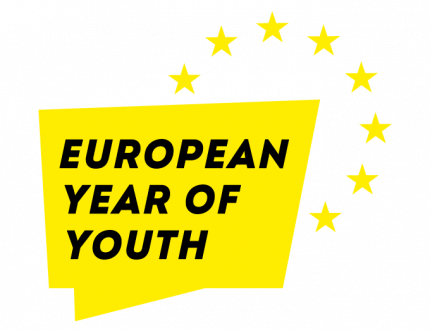
-
European Year of Youth 2022
Make your voice heard!
2022 is the European Year of Youth, shining a light on the importance of European youth to build a better future – greener, more inclusive and digital. With plenty of opportunities to learn, share your vision, meet people and engage in activities all over Europe, the European Year of Youth is the moment to move forward with confidence and hope in a post-pandemic perspective.
Find out what the Year has in store for you and join in the
#EuropeanYearOfYouth!Fold out
To honour, support and engage with young people at all levels, the European Year of Youth will pursue four objectives:
Renewing the positive perspectives for young people, with a particular focus on the negative effects the COVID-19 pandemic had on them, while highlighting how the green and digital transitions and other Union policies offer opportunities for young people and for the society at large;
Supporting young people, including through youth work, especially young people with fewer opportunities, from disadvantaged and diverse backgrounds or belonging to vulnerable and marginalised groups, to acquire relevant knowledge and competences and thus become active and engaged citizens, inspired by a European sense of belonging;
Supporting young people to acquire a better understanding of, and actively promoting the various opportunities available to them, be it from the EU, national, regional or local level, to support their personal, social, economic and professional development.
Mainstreaming youth policy across all relevant Union policy fields in line with the EU Youth Strategy 2019 – 2027 to encourage that a youth perspective is brought into policy-making at all levels.
Back to top

Digital SkillUp courses free from the EU
The Digital SkillUp courses are designed to help you to find your way to upskill and reskill in the area of emerging technologies. They are available in Croatian, Dutch, English, French, German, Greek, Italian, Polish, Spanish, Romanian. The course has been created with the Digital SkillUp initiative, which is the brand name of the outputs created under the European Digital Academy project, funded by the European Commission with support of the European Parliament. The project is dedicated to making basic knowledge on emerging technologies available and accessible to all citizens and SMEs. Its aims to create an online training space that will offer learning content and opportunities on topics like AI, Blockchain, robotics, cybersecurity and IoT (Internet of Things) for everyone.
Source Back to top
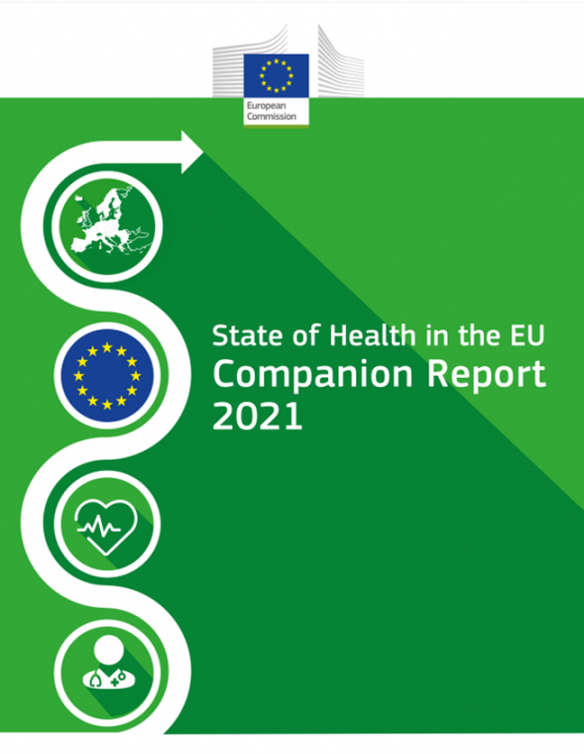
State of Health in the EU
The Country Health Profiles are accompanied by a Companion Report, presented by the European Commission, which highlights a selection of horizontal observations based on the analysis of the country profiles.The 2021 edition of the State of Health in the EU’s Companion Report consists of two parts.
Part 1 presents a chapter focused on European health systems’ resilience in the face of the COVID-19 pandemic. The analysis is focused on 3 main takeaways:Understanding the far-reaching health impacts of the COVID-19 pandemic. The complex, direct and indirect health impacts of the COVID-19 pandemic are only partly captured by currently available indicators. Reaching a full understanding of these will require further data collection and analysis in the coming years.
Locking in the advantages of digital innovation in healthcare delivery and public health. COVID-19 induced a massive acceleration in the uptake of digital health tools in healthcare delivery and public health. In the aftermath of the pandemic, assessing the efficacy, cost-effectiveness, and overall impact of these tools will be paramount to harness and sustain the use of these digital health technologies in the long-term.
Rethinking health workforce strategies and planning after the COVID-19 pandemic. The longstanding issue of health workforce shortages was thrown into sharp relief during the peaks of the pandemic in most European health systems. Building resilience in the health workforce will require action on multiple levers, including more sophisticated workforce planning and increased investment in skill-mix innovations in combination with a sustained expansion of the workforce.
Part 2 of the Companion Report presents a collection of the key findings from the 29 Country Health Profiles prepared by the Organisation for Economic Co-operation and Development (OECD) and the European Observatory on Health Systems and Policies (Observatory).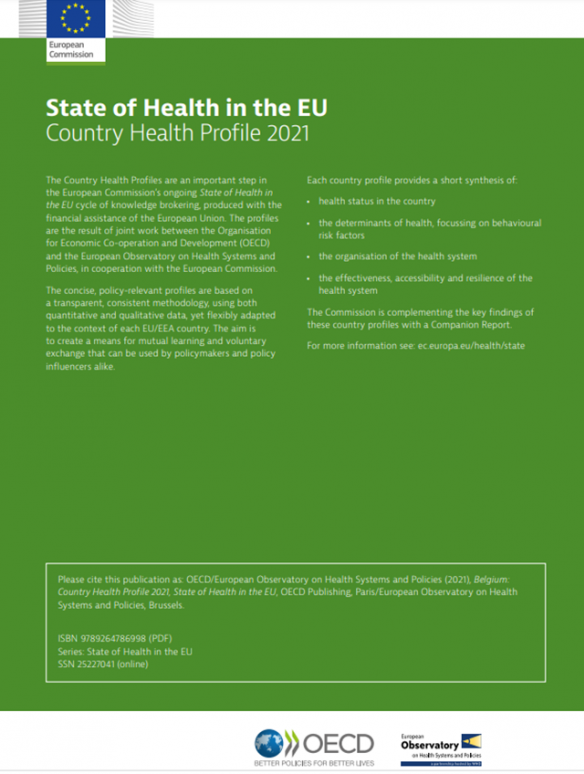
Country Health Profiles 2021
Experts from the Organisation for Economic Co-operation and Development (OECD) and the European Observatory on Health Systems and Policies (Observatory) prepared a set of 29 Country Health Profiles, covering all EU Member States, as well as Iceland and Norway. The State of Health in the EU’s Country Health Profiles are designed to be a one-stop-shop for knowledge and information on a country’s health system, put into the perspective of a cross-EU comparison.
They are a comprehensive resource that covers the latest health policy challenges and developments in each country.
See country health profiles 2021 report Back to top
Blogs & newslettersHere is a list of interesting blogs to follow and newsletters to subscribe to:
Clinical Psychology in Europe CPE
European Commission Newsletter eHealth, Wellbeing & Ageing
European Commission Public Health-EU: e-newsletter
European Parliament IMCO (Internal Market Committee)
European Social Network ESN
Health and Care Professions Council (UK)
Healthcare Professionals Crossing Borders HPCB
International Association of Medical Regulatory Authorities (IAMRA)
Ireland: CORU Regulating Health + Social Care Professionals (Ireland)
United Kingdom: Professional Standards Authority (UK)
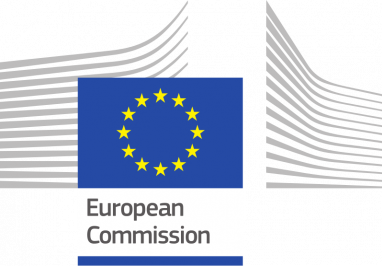
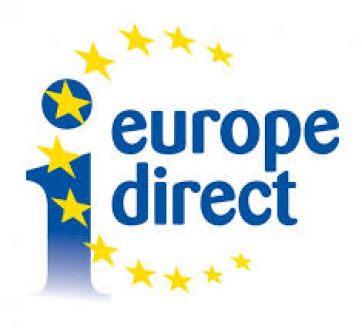
In person:
All over the European Union there are hundreds of Europe Direct information centres. You can find the address of the centre nearest you at: https://europa.eu/european-union/contact_enOn the phone or by email:
Europe Direct is a service that answers your questions about the European Union. You can contact this service:
by freephone: 00 800 6 7 8 9 10 11 (some operators may charge for these calls),
at the following standard number: +32 22999696 or
by email via: https://europa.eu/european-union/contact_en
EU publications
You can download or order free and priced EU publications here Multiple copies of free publications may be obtained by contacting Europe Direct or your local information centre

EU law and related documents
For access to legal information from the EU, including all EU law since 1952 in all the official language versions, go to EUR-Lex at:
http://eur-lex.europa.eu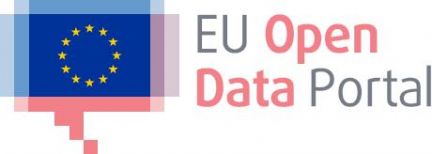
Open data from the EU
The EU Open Data Portal ( http://data.europa.eu/euodp/en)
provides access to datasets from the EU. Data can be downloaded and reused for free, for both commercial and non-commercial purposes.Back to top
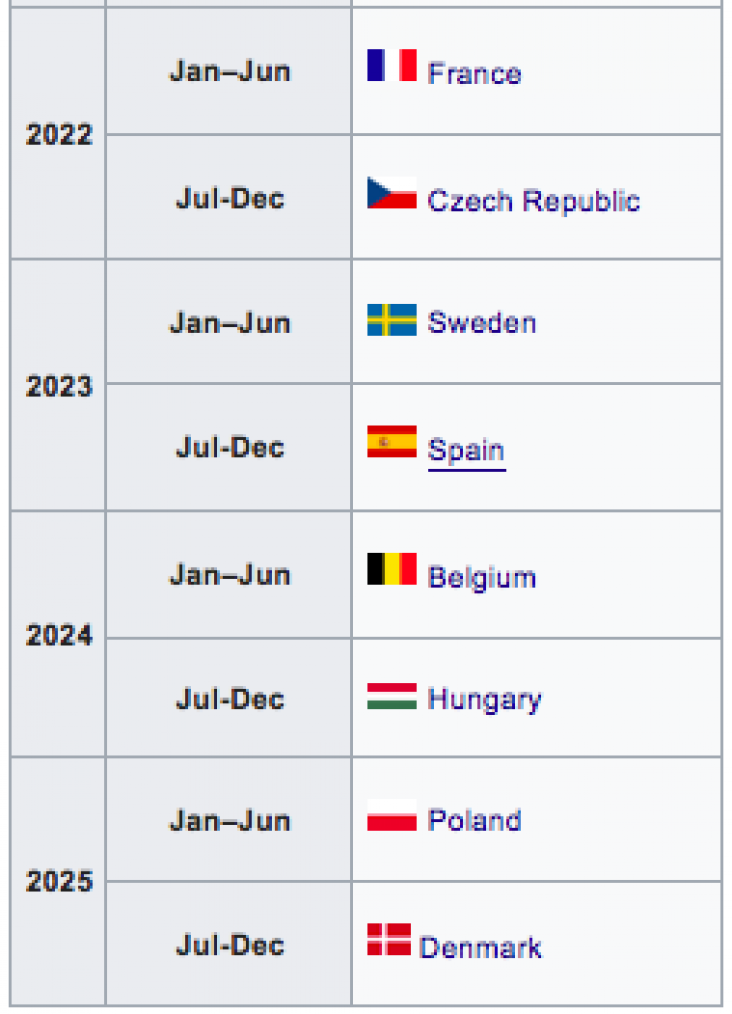
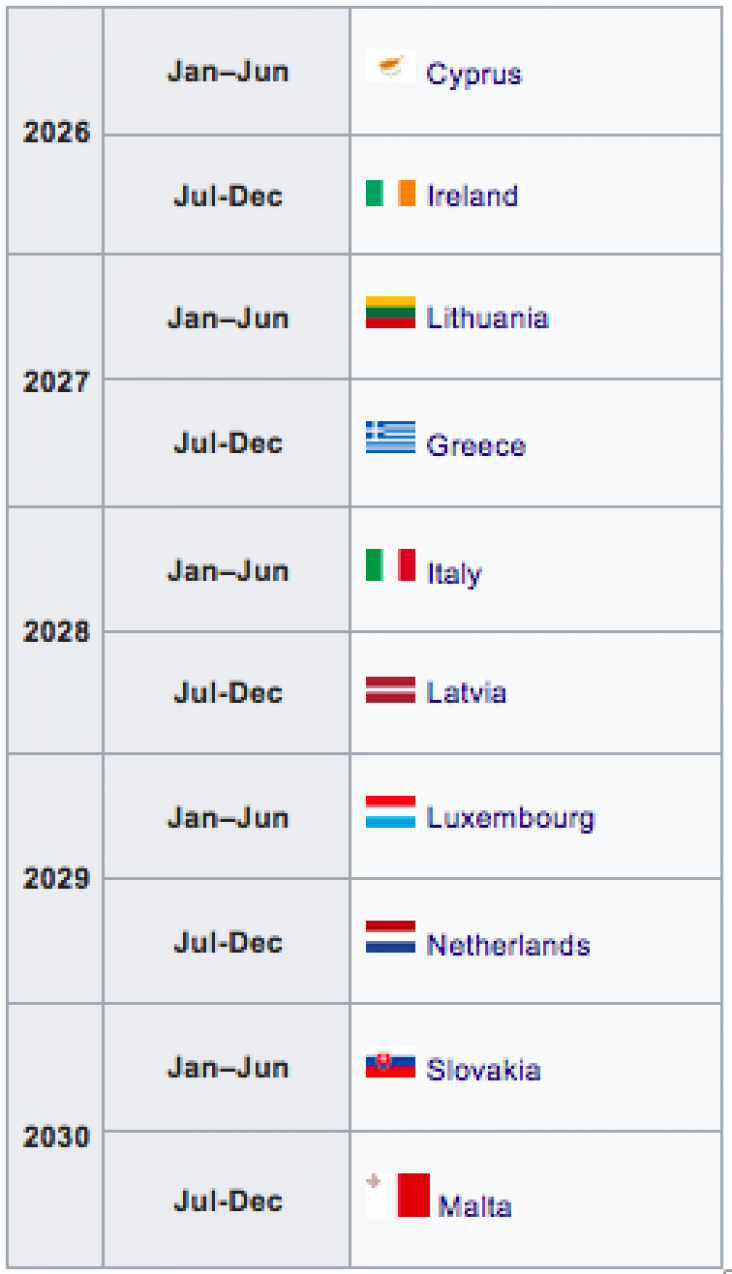
(1)_w1700_h406_1.png)
-
-
-
_w328_h404_1.jpg)
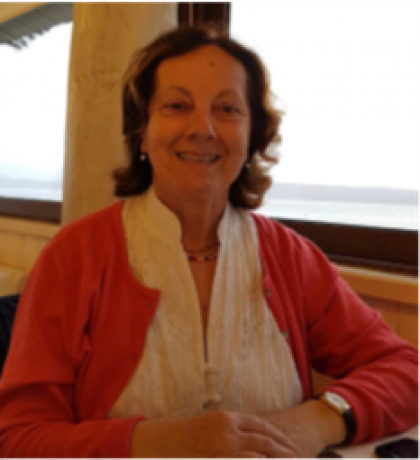
_w1024_h646_1.png)
_w460_h158_1.png)
